Robbie McCauley asked her students, “What shape do you cut in the world?” Regardless of whether she was teaching a graduate-level acting or theatre and community course, or an undergraduate African American drama course, Robbie encouraged her students to think about the impact their bodies had on the world. “Where are your curves? Sharp edges?” She knew people could not answer that knowingly without moving in the space, so she had students do just that. She stretched her own shape around the space, too, learning as she taught. “What parts do you hide? What if you didn’t hide them?”
Robbie was a teacher, community activist, director, award-winning playwright and performer, poet, and mother. Her body of work has provided audiences with a glimpse of one Black woman’s lifelong journey spent vulnerably exploring oppression in America. She found theatre to be her mode for expressing what she could not express in reality. “I wish I could rage in life like I can on stage,” she once shared with me. “Maybe that’s why I can’t live without it.”
I met Robbie in 2010 when I was a graduate student at Emerson College. In a contemporary women playwrights course, we read her Obie-winning play, Sally’s Rape, a layered script about the effect of generational trauma of slave rape on Black women, but also about race relations between Black and white women, and about the limits of the educational system. I immediately signed up for Robbie’s community engagement and acting courses. We formed a mentorship and friendship during 2011 when I assisted directed Robbie’s one-woman show Sugar alongside director Maureen Shea at ArtsEmerson. After I wrote my master’s thesis about her, I had the privilege to direct her in a revision of Sugar in 2016. Through these experiences with Robbie, I learned to “own my shape.” When she died on 20 May 2021, I wondered, How can the world continue with a Robbie McCauley–shaped hole in it? Now I ask, How can her work continue?
Robbie challenged the status quo of theatre systems, from the classroom to the rehearsal room to productions. Her consistent confrontations with race and other charged topics through theatre practices offered alternative ways of approaching the work, promoting a marginalized aesthetic of “the body knows and the body speaks” as a mode for engaging in theatre and community.
“I write what comes up in my body,” she shared with me in a conversation. With this statement, Robbie offered a revolutionary way of knowing. To move and let the body bring up what should be studied. “I do scholarship on stage. I discover knowledge as I perform.” She wrote on her feet. Letting her Linklater-trained body stretch, dance, drop, punch, kick, Robbie felt the words rise in her. She wrote them down and used the stage to explore them. Sitting in the audience for one of Robbie’s performances meant moving with her, noticing one’s own physical empathy with her body vulnerability. “I’m not expecting to change the world through theatre,” she said, “but I can shift it a little.”
In the rehearsal room, Robbie-as-performer modeled how to assert agency by listening to the body. Regardless of what had been blocked, she would often halt mid-line, think, listen to something inside her, move again, move differently, try the words in a different register, repeat the phrase with sounds only—an arm reaching this time, a knee lifting next time. As suddenly as her exploratory listening had started it would stop, and she’d return to obedient actor. “Okay, I’m ready to move on. Where do you want to start from?”
Watching her bold comfort of impulsively exploring possibilities changed me as a director. I realized how our theatrical systems often place authorities rather than experimentation and discovery at the center of storytelling. Productions, auditions, and classes train artists to remain beholden to concept, schedule, or commercial expectations. What might theatremakers learn if the status quo was centered on impulse and exploration?
Robbie worked like a jazz musician. She understood the power of jazz, the discovery it could lead to when one adopted the aesthetic approach of letting a new note drop in, a phrase repeat, a reprise arise later. She understood the impact this had on audiences, too. Her shows often included jazz musicians on stage. “I become part of their riffs and improvisations,” she said. “And sometimes the audience does too.” She embraced audiences’ effect on performance, wrote moments into her scripts for audience conversation. “They’re in the room. We’re in this together.”
Robbie worked like a jazz musician. She understood the power of jazz, the discovery it could lead to when one adopted the aesthetic approach of letting a new note drop in, a phrase repeat, a reprise arise later.
In a performance of Sugar, about her battle with diabetes and America’s healthcare disparities, she asked audiences, “What do you think of the war in Afghanistan?” (The audience’s answers gave her language to describe diabetes.) One night, a woman called out “Twisted!” “Twisted,” Robbie echoed admiringly, hearing this word viscerally. She continued her script, “All my life has been war with sugar.” But “twisted” penetrated her. Changed her thoughts and movement, rerouted the rehearsed show. She spoke the word and contorted her body. Her musician joined in, not knowing where she was going, but trusting jazz. Robbie twisted with music, letting guttural sounds emerge, shaking her shoulders, bending over, mumbling painfully. What was her body bringing up that she would write down if she had pen and paper? Eventually she returned. “Twisted, mmm.” She gestured to the speaker, “Thank you.” The rehearsed version resumed.
Robbie embedded so much realness into teaching, directing, performing; she transcended theatre. Students, colleagues, and audiences often responded to her with awe and fear, as if her next action could cause a spiritual transformation. Sleeping Weazel artistic director, Charlotte Meehan, has described her as a “theatre shaman.” Robbie shared that when she broke character onstage during performances of Sally’s Rape to hand out cookies to audiences, they looked at her like she was God handing down manna. “It’s just a cookie,” she’d say. She’d altered the status quo of theatre-watching. The effect was that something simple became something sacred. She had to give them permission to interact with this everyday object as they would normally. Leaning into the role they’d cast her in, she’d say, “Take and eat,” easing them out of mere receptivity into participation, trust, and journeying.
Robbie believed in what she called the “personal bigger.” She asked, “What can we learn about the bigger world by exploring our personal experiences?” This drove her teaching as well as performing because she embraced the personal experience of the student. “What’s coming up in your body when you say that line?” she would ask a student performer. They might answer, “Heat.” She’d soak in the word, modeling the experience of feeling alongside the performer.
Performer: Heat... Like shame, maybe?
Robbie: Mmm. (She is interested.) Heat, like shame.
Performer: (Growing confident in vulnerability because the instructor has felt it, too.) Like a lead ball in my gut.
Robbie: (Soaking in.)
Performer: (Silence.)
Class: (Soaking in.)
Robbie: (Looking at class like they are teachers. Waiting for instruction.)
Classmate: (Taking the risk to share.) I get that.
Another classmate: (Taking the risk to become the teacher.) How does your shame move?
Robbie: (Looking at performer, ready to learn from the answer.)
Performer: I don’t know. I’m scared to let it move.
Another classmate: What would happen if you let it?
Robbie: (Silence.) Let’s all feel the lead. Let’s get on our feet and move with the weight.
As students get on their feet, they discover shame and weight in their own bodies. They discover a connection to one another. Personal bigger.
Robbie-as-teacher was also a jazz musician, willing to follow the impulse and upend the status quo of the classroom. When any of us students threw up a wall because we were focused on a systemic goal (like a grade, or a perfectly rehearsed monologue), she’d say, “Engage in your resistance.” Thicker walls. Did she really not value the importance of a transcript?, we might think. “Do others feel resistance?” she’d ask. A couple of hands. “Good,” she’d respond. Soaking us in. Stretching. “When was another time you felt resistant?” With a gesture of her hands, we’d move into a story circle. When we emerged from the circle, we had forgotten that grades ever mattered.

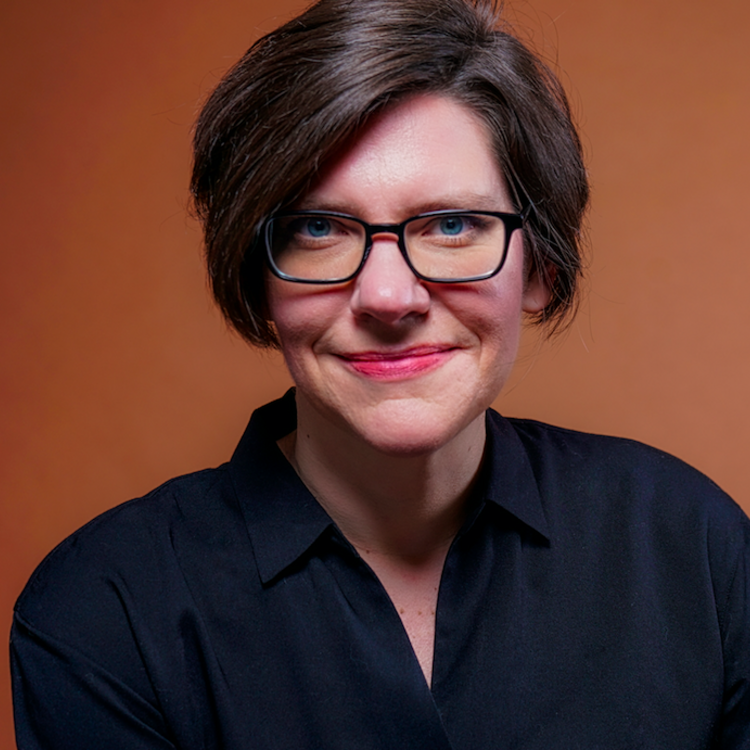
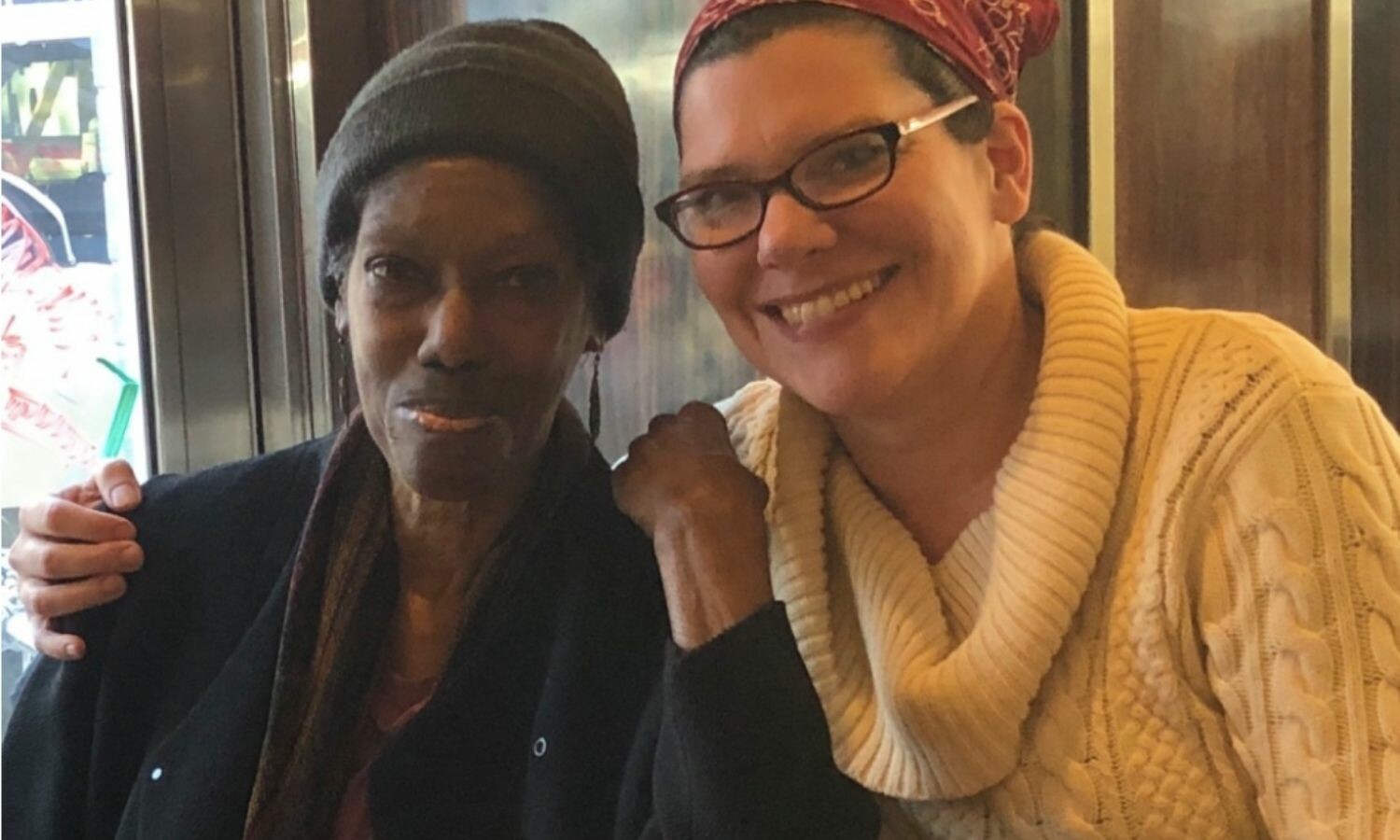
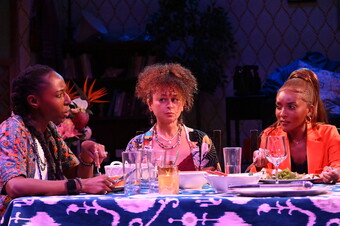


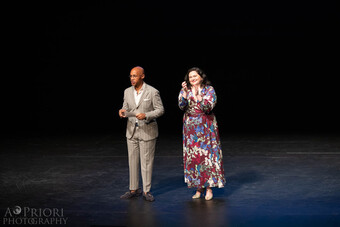


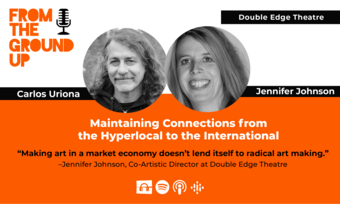



Comments
The article is just the start of the conversation—we want to know what you think about this subject, too! HowlRound is a space for knowledge-sharing, and we welcome spirited, thoughtful, and on-topic dialogue. Find our full comments policy here
Jeff- I love your observation that Robbie’s presence in the audience for a show transformed the watching/performance itself. I am interested in giving that more thought. How is a performance transformed by the attendance of specific audience members?
Wonderful to read about some of the techniques Robbie worked with in class. When she and Jeannie first did SALLY'S RAPE, I was in awe and still am. I last spoke to Robbie at James Scrugg's brilliant and disturbing SUPREMACYLAND, which was transformed simply by her being in the audience. Robbie remains a transformative presence.
Thank you, Debra and thank you for sharing your own memories of time with Robbie.
Thanks so much for this beautiful article about Robbie McCauley! I was hoping to read such an honoring... I am of Robbie's generation, and remember so clearly first reading about Sally's Rape, and then hearing about Robbie's trilogy of pieces exploring race and geography (if memory serves, the Boston chapter, performed at
Charlestown Working Theatre, was called Turf.... yes?), and then the excitement about her coming to be part of our community by joining the Emerson faculty, and then seeing Sugar.... which had an additionally strong impact for me, being a fellow diabetic. I will keep and re-read your vivid documentation of her physically-driven explorations --- part of the legacy of theater practice from those earlier decades, so useful to remember and re-engage --- and a practice she, of course, made all her own. Thank you, Robbie, for your gifts, and Tara, for reminding us. Debra Wise, AD, Underground Railway@Central Square Theater